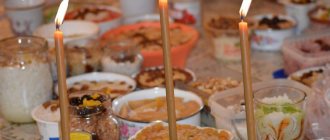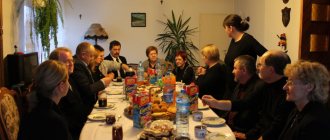Memorial calendars for 2022. Customs, traditional prayers and the meaning of memorial days among Orthodox Christians.
Memorial days, memorial meals and other customs help to understand how to say goodbye to the deceased correctly. This is probably the main purpose of customs and rituals - to orient people on how to do memorial days at a time when it is difficult for them. In our next article we will try to tell you as accurately as possible about the funeral menu and rules for 40 days, parental memorial days and other customs that the Orthodox Church prescribes to observe.
Memorial days after a funeral: how to count correctly among Orthodox Christians?
When 9 days pass after the funeral, how do you count memorial dinners on which days? When is it especially important to pray for the soul of the deceased and say words on the memorial day? Such questions are very often asked by loved ones of a deceased relative. And there really is something to think about, because days 9 and 40 are calculated taking into account the day of death. And the memorial date turns out to be 1 day less than if you simply added 9 to the date of death.
For example, a person died on December 1, this means that nine days after his death will be December 9. And not December 10, as in ordinary arithmetic, when 1+9=10.
Memorial days after a funeral - how to count correctly for Orthodox Christians? Use the rule - date of death plus nine days and minus one.
The funeral menu and rules for 40 days are also timed to coincide with the date, which is calculated in a similar way.
For example, a person passed away on December 1, December has 31 days. We take into account that the day of death is also counted, and we get that 31 days from the moment of death passed in December. There are still 9 days short of forty days, we add them and we get that 40 days will be on January 9th.
Please note that you need to count 9 and 40 days from the day of death, and not from the day of the funeral.
Memorial days after a funeral, how to count correctly for Orthodox Christians? What is the meaning behind these dates? This question is complex, the video below expresses the opinion that time exists only for the living, and the souls of the dead live in a world where there is no time. And it’s good for them that they are remembered with a kind word, they pray for them, and funeral services are held. It makes no difference at what point in time this happens.
Minute of silence
You can remember the dead only when you believe that they are alive. This thought, paradoxical at first glance, is confirmed, however, not even by church teaching, but by ordinary human intuition. “We’ll all be there...” - this is the most common formula among our people for commemorating the dead. And it must be said that this is a very deep relationship - looking at someone else’s death, remembering your own. But there is a very important point, which is not indicated in any way in this formulation: and, in fact, where is it – “there”? What is beyond the line that the deceased has already crossed and which sooner or later each of us will have to cross? If behind it there is only emptiness, non-existence and the complete destruction of human self-awareness, then the very phrase “we will all be there...” loses all meaning, since there is simply no “there” in this case and cannot be. It turns out that by remembering our dead even with such a simple phrase, we confess our faith in three serious facts at once:
- Biological death does not destroy the human personality.
- After death, having lost his body, a person finds himself in another, unknown to us as yet, but quite real world.
- The transition to this world is objectively inevitable for all people, regardless of their personal desire.
When a loved one is admitted to the hospital, we visit him, bring him books, fruits and chicken broth in a jar, tell him the latest news and, saying goodbye, say that we will definitely come to him again tomorrow. If someone dear to us is in prison, we also know how to show our love for him, we know what he needs, we collect parcels for him and send him parcels, write letters, go on dates, in short - we do everything , which can help him endure the hardships of imprisonment.
But when a loved one dies, it always puts us in some kind of dead end. No, we, of course, did not love him less; the bitterness of separation even strengthened our feeling and helped us understand how dear to us is the one whom death took from us. But what to do next, how to express this love of ours, how to make it reach our loved one and help him, or please him where he finds himself - we don’t know. We simply have no experience of being there - beyond earthly life, we cannot even imagine what happens to a person after death. And when you lack your own personal experience, it is quite reasonable to turn for help to where such experience is available - to turn to the Church, which has been commemorating its dead for almost two thousand years and has a huge amount of evidence of the effectiveness of prayerful remembrance of the dead. Therefore, very often the death of a loved one brings to the Church even those for whom the opinion of the Church has never been authoritative in all other issues of their life.
In general, without belief in life after death, remembering the dead is a rather pointless activity. During the Soviet period of our country’s history, there was such a tradition - to honor the memory of those who died in the Great Patriotic War with a minute of silence. For an atheistic state, this was a very logical ritual. The man’s heart demanded: “Thank these people. For your calm and peaceful existence, they gave the most precious thing they had - their life. You are forever in their debt, thank them.” But the mind objected: “How can you thank those who are not there? What words can you say to someone who is not just not next to you, but nowhere at all, just as you yourself were not there before you were born?” There is no point in addressing non-existence with any words; there really remains only mournful silence. Like some kind of solemn expression by an unbeliever of his powerlessness in the face of the death of loved ones.
For the atheistic consciousness, only wordless forms of commemorating the dead are possible, be it a minute of silence or a memorial glass - silently and without clinking glasses.
But if a person refuses to believe that his loved ones, dying, disappeared without a trace in the cosmic space, if he believes that they are alive, and hopes for a future meeting with them (even after his own death), then for such a person to express his hope, faith and love simply need words. And a simple, casual “...we’ll all be there” is clearly not enough here. We need other words - more precise and beautiful, we need to understand what the meaning of such a commemoration is, we need to figure out, finally, what happens to a person in this most mysterious “there”, where we all will eventually have to end up.
VIDEO: About the need to remember the dead without paying attention to dates
There is also a church legend that goes from mouth to mouth, which says that the funeral menu and rules for 40 days were invented for a reason. They say that the soul of the deceased does not immediately go to another world, but speeches and words on the memorial day must be kind and are especially important on these days.
- They say that for 3 days after death the soul of the deceased remains near the body.
- After the 3rd day, the soul of the deceased goes to heaven. And there he remains until the 9th day, in beauty, luxury and surrounded by Angels. The figure of 9 days echoes the fact that there are 9 angelic ranks. However, if the soul of the deceased was sinful, the divine beauty of the heavenly chambers begins to depress it.
- From day 9 to day 40 the soul goes to hell. This figure also echoes the biblical scripture, which says that Jesus resurrected on the third day after his crucifixion, then appeared to the apostles for 40 days. And on the 40th day, in his earthly flesh, he ascended to heaven and his body became divine and invisible to the human eye. The Orthodox world celebrates this event with the Feast of the Ascension.
Other days for commemoration
You need to remember the deceased several times a year, not only during the periods described above. Thus, the traditional day of remembrance is his birthday and name day. In addition, in Christianity the following days are established for commemorating the dead:
- Trinity Saturday;
- Dmitrievskaya Saturday;
- Radonitsa;
- Parents' days;
- Universal Meat Saturday.
On these days, commemorations are carried out according to traditional Christian rules.
After death, when a person's physical body is buried, the main task of his relatives is to take care of the soul of the deceased. For this purpose, commemorations are organized.
Some funeral traditions are established by religious norms, others have come to us from ancient times, from our Slavic ancestors. By strictly observing them, relatives help the soul of the deceased to easily leave this world and move to the Kingdom of God, and can also more calmly experience the loss by praying with loved ones.
Parents' memorial days: dates of parents' Saturdays and Radonitsa for 2022
It is important to remember your deceased loved ones, but the funeral liturgy and prayers are even more necessary for those who have no one to remember. Someone found his death and was not buried according to Christian custom, someone simply has no one to remember, and someone died so long ago that his name has already been forgotten and lost through the centuries. The 2022 calendar of memorial days will tell you the days on which it is worth stopping and remembering the dead, your family members and all other people who are no longer alive.
Parents' memorial days - dates of parents' Saturdays and Radonitsa for 2022:
2 ecumenical parental Saturdays are circled in red - Meat and Trinity .
- These days, special services are held in churches, the purpose of which is to facilitate the existence in the afterlife of all Christians since the time of Adam and Eve. Meatless Saturday got its name because it is followed by Meatless Sunday - the day when Orthodox Christians begin to prepare for Lent and “release” meat. After this parental Saturday comes the joyful holiday of Maslenitsa, but Meat Saturday already forces us to gather, pray for the dead, realize that our earthly path is not eternal and prepare for Lent.
- The second universal parental Saturday, Trinity, falls on the Saturday before Trinity . Scripture says that on the Day of the Holy Trinity an Angel descended to the Apostles, who gave them the power to preach. This day is considered the birthday of the Church. And on the eve it is customary to serve an ecumenical memorial service, during which prayers are raised to heaven for the souls of all deceased Orthodox Christians.
Parents' memorial days: dates of parents' Saturdays and Radonitsa for 2022.
Memorial days or parental Saturdays in 2022
- In March and April there are parental Saturdays, which fall during Lent . During this period, there are few days when full services are held in churches, which means there is an opportunity to pray for the dead. In order not to deprive the departed of prayers, the church has specially designated days, or parental Saturdays, on which commemoration is performed.
- Special days of remembrance - On May 9, services are held in churches to remember those who died during the Great Patriotic War.
- Radonitsa in the Orthodox calendar is designated on Tuesday after St. Thomas Sunday, in other words, on Tuesday, a week after Easter. Radonitsa still remains one of the most controversial customs. It has two meanings: on the one hand, around these days, our ancestors also had a day of remembrance in the pre-Christian era. On the other hand, Christian tradition excludes memorial services for a whole week after Easter, since this is a very bright holiday. If a person dies during this period, he is buried in a special way. And Radonitsa is one of the dates officially recognized by the church, on which days funeral dinners should be held at home, alms should be given to the poor and people should go to the cemetery.
- The calendar of memorial days for 2022 includes a special memorial service on September 11 , the Day of the Beheading of John the Baptist. The tradition of commemorating fallen soldiers on this day was approved by Catherine II. This date is often ignored in modern worship.
- Dmitrievskaya Parents' Saturday falls on the Saturday before Dmitriev's Day ( November 6 ). Initially, it was a day of remembrance for the soldiers who fell on the Kulikovo Field, but gradually turned into a day of remembrance for all the dead.
For more information about the important dates of the Orthodox church calendar, read the articles:
- Calendar of fasts, parental Saturdays and full weeks in 2022: dates.
- Orthodox church wedding calendar for 2022: favorable days, beautiful dates for a wedding in 2022, signs for a wedding
Rules for holding Christian funerals
The main rule regarding funerals is the ban on holding them on two days a year: on Easter Day and on Christmas Day. On other days, a wake must be held, but it is not necessary to invite a clergyman for this. In his absence, the ceremony is led by the eldest of those who came to the funeral. If they are carried out with the participation of a priest, it is this person who performs the funeral litany, reads the prayer “Our Father” and blesses those present for eating.
At the table at which the funeral meal is held, one empty place is always allocated, intended for the deceased. An empty chair is placed for him, and on the table there are cutlery and a simple treat: a glass of vodka, covered with a piece of bread. Taking the place of the deceased at the table is strictly prohibited, even if one of those who came did not have enough space.
Lunch begins with a minute of silence. After this time, the leader of the ceremony (usually the eldest of those present) gives the floor to everyone who came in turn, so that they remember the good things about the deceased. First, such a word is given to relatives (according to the degree of relationship), and then friends, colleagues and close people who are not blood related to the deceased begin to speak.
Such speeches are supposed to be made standing, trying to avoid tears, accusations and hysterics. If the speaker cannot control his emotions, it is better for him to take a break and end his speech with the phrases “May the earth rest in peace,” “Eternal memory” and other similar statements.
At funerals, it is not customary to be overly eloquent, demonstrating one’s skills, and making long toasts. The main goal of any speech on this day is to remember the good things about the deceased and demonstrate his positive qualities to everyone present. It has been noticed that kind words spoken to the deceased help his family come to terms with the loss, dull everyone’s grief, and make the path to the spiritual world easier for the deceased himself.
At the end of the funeral, everyone who comes must bow towards the place that is organized at the table for the deceased. This bow is done while standing at full height, demonstrating respect for the deceased.
Saying goodbye with the words “bye” or “goodbye” at a wake is prohibited. Instead, it is better to once again express your condolences to the relatives and mourn their loss. If there is food left after the funeral dinner, it is distributed to everyone present at it, as well as to the poor and needy. It is believed that this will allow as many people as possible to remember the deceased with a kind word and ease his lot in the new world.
Funeral menu and rules for 40 days
The tradition of holding funeral dinners or funeral feasts came to us from time immemorial, and initially it was customary to seat the poor, crippled, orphans at the table - in short, those who themselves could not afford delicious food.
- The funeral menu and rules for 40 days are prescribed to show mercy on this day, feed the needy, and from the bottom of your heart treat people with what you are rich in.
- The only traditional dish on the funeral table is kolivo or kutia . Initially, kutia was prepared from wheat or barley grains, which symbolized death, which brings life with it. When the grain falls into the ground, it rots, but a whole ear is born from it. Honey was also traditionally added to kolivo - it symbolized the sweetness of life after resurrection. Nowadays kutya is often prepared from rice.
Kutya for a funeral dinner for 40 days
A funeral table for 40 days during Lent should contain exclusively lenten dishes. It can be:
- Kutya.
- Lenten pancakes.
- Lenten pies.
- Lenten salads.
- Pickles
- Legumes
In general, food at a funeral is not particularly important; it is believed that people who have been to the church and cemetery are simply hungry, so the menu is prepared at your discretion. Also, but only from Lenten dishes, a funeral table is assembled for 40 days during Lent.
Funeral prayer for 40 days after death
The rules for 40 days for Christians, first of all, must be combined with prayer. You can pray at home yourself, but it is believed that it is better to do it in a temple.
- It’s good on the evening before 40 days from the date of the death of the deceased to go to church and submit a note “for proskomedia” - the initial part of the service, when a prayer is read for all baptized and deceased Christians. And in the morning come to church yourself.
- You can also submit a note to a memorial service - a special service designed to help the deceased. You can find out on what days the memorial service is celebrated in the church. In churches near cemeteries, funeral services are often held every day.
- A memorial prayer for 40 days after death can also be read at the grave of the deceased. To do this, a priest is invited to the cemetery to serve a funeral litany . The prayer for the 9th memorial day can be the same as for the 40th.
- Those who cannot afford to invite a priest have the opportunity to pray for the deceased themselves by reading a litany for the laity at the cemetery.
One of the texts that can be read at the grave of a deceased person is below:
Prayer for the deceased
In continuation, it is customary to read “Our Father.” Such a memorial prayer for 40 days after death is read by ordinary people. This text has been adapted to be clearer.
Continuation of the litia for the laity
Lost pilot
When we turn away from the light, we risk finding ourselves in the darkness of our own shadow. If a person has made the main content of his life not the desire to change for the better, not preparation for this posthumous meeting with his Creator, if he has exchanged his life for cheap or expensive entertainment, for the intoxication of power, money or his own genius, then he has serious problems. Without learning to love God, without seeing His love for oneself during life, and having tightly shut oneself into the shell of one’s own passions and desires, a person cannot and will not want to be with God even after his death.
Sin is terrible because a person can enjoy it only while he is alive. The purpose of the soul is to control the body, and only in their combined existence can a person fully live, act and change himself both for the better and for the worse. Death takes the body away from the soul and makes it incapable of any action, and therefore of change. The soul can no longer sin or repent; and, as it became at the time of a person’s death, it will remain so in eternity. To make this clearer, we can imagine that our life is a flight, our body is an airplane, and our soul is a pilot who knows that his fuel supply is limited and allows him to fly, say, five thousand kilometers to his destination. If he does not lose contact with the dispatcher and keeps the right course, then despite bad weather, poor health and engine problems, he will still reach the airfield. Or he will make an emergency landing somewhere nearby, so that rescuers can easily find him. But when the pilot flies at random, wherever his eyes look, without reference points and goals, and doesn’t even think about what will happen to him and where he will end up when the fuel runs out in the tanks... Most likely, such a would-be pilot will completely get lost, landing in God knows where, and there he will disappear without a trace, because it is unclear where to look for the one who was flying to an unknown destination. And he can’t get out of there on foot.
The Lord spoke about this very clearly: “Whatever I find, that is what I will judge.” This does not mean at all that God is indifferent to what happened to a person before death, and in what condition he died. On the contrary, the Church says that the Lord calls a person to judgment at the most favorable moment for his posthumous fate. Each of us dies either at the peak of our spiritual development, or when God sees that further life will change his soul only for the worse. But a person must take the right course and lead himself to this spiritual maximum. And no one can do this work for him, not even God.
But what can relatives do for such a lost pilot, how can they help him? They can do a lot - make the phone of the head of the airfield, which the missing pilot could not reach, red-hot, bombard the ministry with letters, bang their fists on the table in various offices and - demand, demand, demand the organization of new rescue and search expeditions. The right to such persistence gives them love for the missing.
And our love makes us turn to God with requests for forgiveness of the sins of our loved ones and for their repose “with the saints.” This is one of the meanings of prayerful remembrance of the departed in the Orthodox Church.
Funeral lunch for 9 days: menu
This lunch can contain any food, perhaps, with the exception of those that are associated with celebration and fun, such as soda, cream puffs and cakes. However, the table can and should be rich and satisfying.
Funeral lunch for 9 days - example menu:
- Borsch with sour cream.
- Chicken fillet chops.
- Pork cutlets.
- Fish baked in foil.
- Greek salad.
- Salad with cheese and rice.
- Pancakes with honey.
- Compote, or better yet jelly.
Prayer for the 9th memorial day is important, but it is also important to show mercy to people. One of the traditions is to distribute donuts at funerals. Below we will tell you how to prepare funeral crumpets for 9 days; we suggest taking recipes so that the dough turns out airy and sweet.
Kefir donuts
To prepare the dish you will need the following ingredients:
Funeral donuts for 9 days
- Kefir and sour cream are mixed with soda and left for 10 minutes.
- Beat the egg, vanillin, vegetable oil and salt.
- Then mix the egg mixture with kefir.
- Finally add flour and lemon zest. The dough should not take long; the egg white may shrink due to acidity.
- The dough is rolled out and circles are pressed out using a mug.
- The donuts are fried over moderate heat in vegetable oil.
- Before serving, they are sprinkled with powdered sugar.
VIDEO: Kefir donuts
Funeral donuts for 9 days: recipes with yogurt
Donuts do not have to be prepared according to old recipes. Products such as yogurt and ready-made baking powder will also be appropriate.
VIDEO: Donuts with yogurt
What is served at a funeral?
The traditional Christian funeral dish is kutia, a sweet porridge made from rice or wheat with honey. Before serving, it must be blessed in the church, and if this is not possible, the food is sprinkled with holy water in the house where the funeral is held. It is believed that the grains from which kutia is made symbolize life, and the sweetness of honey is intended to remind of the joy of the righteous in another world.
It is interesting that in ancient times, when rice was not part of the daily diet of Christians, kutia was cooked from wheat, adding hazelnuts and poppy seeds. This dish was called kolevo and was common among the Slavs until the 12th century.
If a funeral is held during Lent, only plant-based Lenten dishes should be served on the table, despite the mournful occasion for the meal.
In addition to kutya, it is customary to serve pancakes on the day of the funeral. Their round shape is believed to symbolize the life cycle of each person, from birth to death.
For a funeral meal, baked goods and sweets must be prepared. They are eaten at the table and given to the poor as alms so that they too can remember the deceased
Funeral table on the day of the funeral: menu
How to set a funeral table on the day of a funeral, in accordance with Christian tradition? The menu does not provide for strict rules; the only thing is that it must be made up of products allowed during Lent, if the sad date falls during this time.
However, there are some optional traditions that tell you how to properly set the funeral table on the day of the funeral; the menu may contain:
- Kutyu.
- Pancakes without filling with honey.
- Kissel - this particular drink was traditional at funerals for many years.
What to prepare at the cemetery on a memorial day, is it possible to take candy?
The Church does not strictly prohibit holding funeral dinners in a cemetery, but many clergy are inclined to believe that it is better to do them at home. Those who are wondering what to cook at the cemetery on a memorial day, whether it is possible to take sweets, have probably heard that leaving food and alcoholic drinks on graves is a pagan rite.
- The Orthodox Church says that food brought to a cemetery should not be left on gravestones, but distributed into the hands of those in need.
- For those who are thinking about how to properly spend a memorial day, it will also be important that the church does not approve of the consumption of alcoholic beverages at a memorial service.
When deciding what to prepare at the cemetery on a memorial day, whether you can take sweets with you, it is important to remember what significance this day is endowed with in Christianity. Radonitsa is the date when the living go to the cemetery to visit their deceased relatives to tell them the good news of the resurrection of Christ. This message should bring comfort and say that the separation of the dead and the living is not eternal. Therefore, eggs and Easter cakes will come in handy on this day. You can take sweets here if you wish.
Is it possible to work on memorial day and get a manicure?
Radonitsa is not considered the twelfth church holiday, which means you can work on this day. But please note that Radonitsa is exactly Tuesday, 9 days after Easter. In some areas it is traditional to go to cemeteries earlier - on Sunday or Monday. And in this case, those who are concerned about the question of whether it is possible to work on a memorial day, get a manicure, get a haircut - will receive a negative answer regarding work. You cannot work for nine whole days after Easter until Tuesday.
When deciding whether it is possible to work on a memorial day, do a manicure, get a haircut or clean up, you need to understand that the church does not forbid you to go about your business. Especially if there is an urgent need for it. Another thing is that you shouldn’t replace going to church with going to the hairdresser.
Rich relative
In the conversation about commemorating the dead, an important question is often missed: who, in fact, needs such commemoration more - them, or ourselves? It would be endless arrogance and impudence to claim that one of our deceased loved ones has gone to hell, needs help and needs to be begged for. Christians have a commandment not to judge their neighbor during their lifetime. It is all the more absurd to pronounce a sentence on someone who has already completed his earthly journey and has appeared before the judgment of God. We can worry about him, like parents worry about their son who has gone to study in a distant city. But we must not forget that we have a rich and loving relative in this city. Moreover, he is not just rich - he is the most important person in this city and decides all issues there, no matter what they concern. And we should not tear our hearts out with worries - this relative will take care of our son much better than we ourselves. But this concern does not prevent us from sending him letters, parcels with all sorts of goodies and pocket money. The son may not need anything, but our rich relative is very considerate, he does not deprive us of the opportunity to show our love in this way. And when we call and ask him: “Don’t leave our boy there, please! Look after him, help, otherwise we’re worried here!”, this does not mean at all that without our call the son would have been left without support and attention. We just love him, but he left and is now far away. And what else can we do to show our love and care? Just call and send letters with parcels. Likewise, we ourselves need prayer to Christ for our departed no less than those for whom we pray.
Because we all have such a rich relative. This is Christ, Who became man in order to make us His relatives in the flesh. But relatives are not judged impartially, they are judged with love. His court is not our court. It is enough to remember how many times in the Gospel Christ justifies and defends those whom people have condemned, and for the most just reasons.
VIDEO: Prayer for the repose of the soul of the deceased
On our website you will find many recipes for delicious and beautiful Lenten dishes :
- Lenten tartlets and Lenten salads for their filling.
- The best meatless sandwiches.
- Lenten cutlets: vegetable, mushroom and fish.










